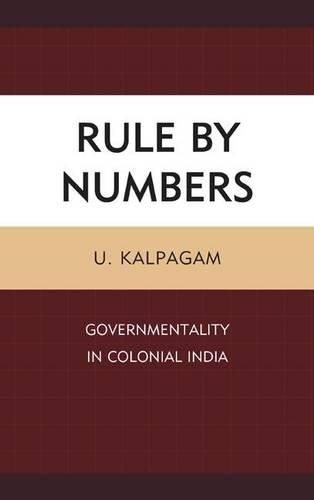
Rule by Numbers: Governmentality in Colonial India
(Hardback)
Publishing Details
Rule by Numbers: Governmentality in Colonial India
By (Author) U. Kalpagam
Bloomsbury Publishing PLC
Lexington Books
20th August 2014
United States
Classifications
Professional and Scholarly
Non Fiction
Colonialism and imperialism
Asian history
954.03
Physical Properties
Hardback
372
Width 162mm, Height 233mm, Spine 29mm
658g
Description
This book examines aspects of the production of statistical knowledge as part of colonial governance in India using Foucaults ideas of governmentality. The modern state is distinctive for its bureaucratic organization, official procedures, and accountability that in the colonial context of governing at a distance instituted a vast system of recordation bearing semblance to and yet differing markedly from the Victorian administrative state. The colonial rule of difference that shaped liberal governmentality introduced new categories of rule that were nested in the procedures and records and could be unraveled from the archive of colonial governance. Such an exercise is attempted here for certain key epistemic categories such as space, time, measurement, classification and causality that have enabled the constitution of modern knowledge and the social scientific discourses of economy, society, and history. The different chapters engage with how enumerative technologies of rule led to proliferating measurements and classifications as fields and objects came within the purview of modern governance rendering both statistical knowledge and also new ways of acting on objects and new discourses of governance and the nation. The postcolonial implications of colonial governmentality are examined with respect to both planning techniques for attainment of justice and the role of information in the constitution of neoliberal subjects.
Reviews
U. Kalpagam has given us a book that is brave, challenging, and ambitious. Drawing on her familiarity with the diverse literatures of postcolonial theory, Foucaultian 'governmentality' and Indian colonial history, she explores the shifting categories of space, time, measurement, and causality involved in the emergence of a colonial governmentality in India that parallels, but differs substantially from, the liberal governmentality that emerged in Europe at around the same period. Both governmentality and postcolonial theorists who are unfamiliar with the other perspective will find here a book that challenges their preconceptions. -- Barry Hindess, Australian National University
Rule by Numbers is a valuable contribution to what has come to be generally known as postcolonial studies. Drawing her inspiration from Michel Foucault, U. Kalpagam has provided a fascinating account of the way the colonial state of British India was formed as an administration producing modern scientific discourses, through which it introduced Western conceptions of space, time, measure, reason, and causality. This book contains a wealth of historical material. -- Talal Asad, Emeritus Distinguished Professor, Graduate Center of the City University of New York
Resolutely Foucauldian in her approach, U. Kalpagam offers a refreshing survey of the emergence of modern technologies of government in colonial India. After a useful overview of notions of sovereignty in pre-British India, she looks at how the abstract space of modern state sovereignty was filled out under British colonial rule into functional sites and the spaces of political economy. She documents this epistemological conquest by looking in turn at the domains of history, economy, society (castes, tribes, religion, race), public health, and the public sphere. This is a valuable introduction to the subject of governmentality and biopolitics in colonial India. -- Partha Chatterjee, Columbia University
Author Bio
U. Kalpagam is professor at the G. B. Pant Social Science Institute, University of Allahabad, India.
